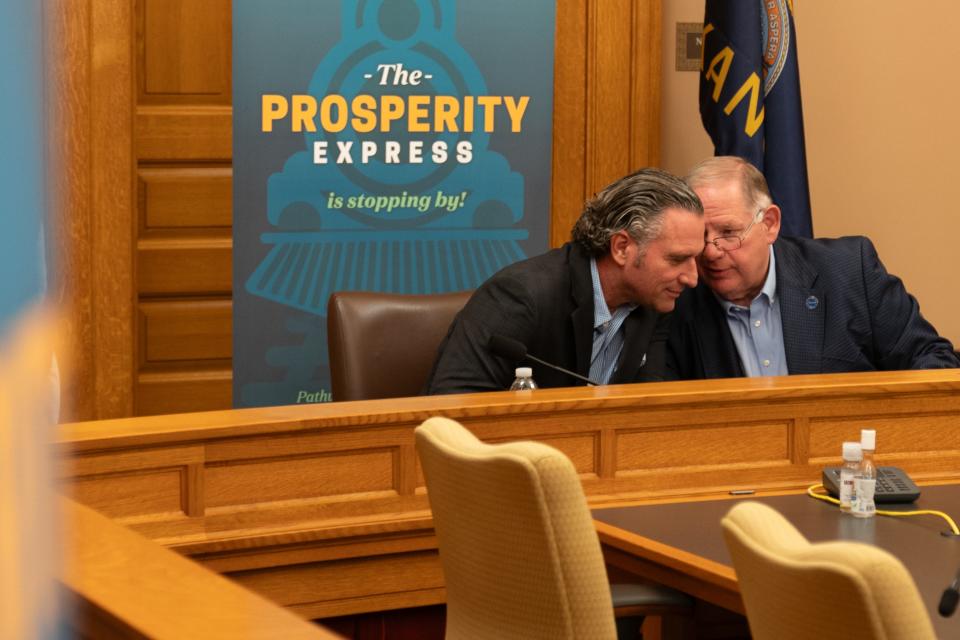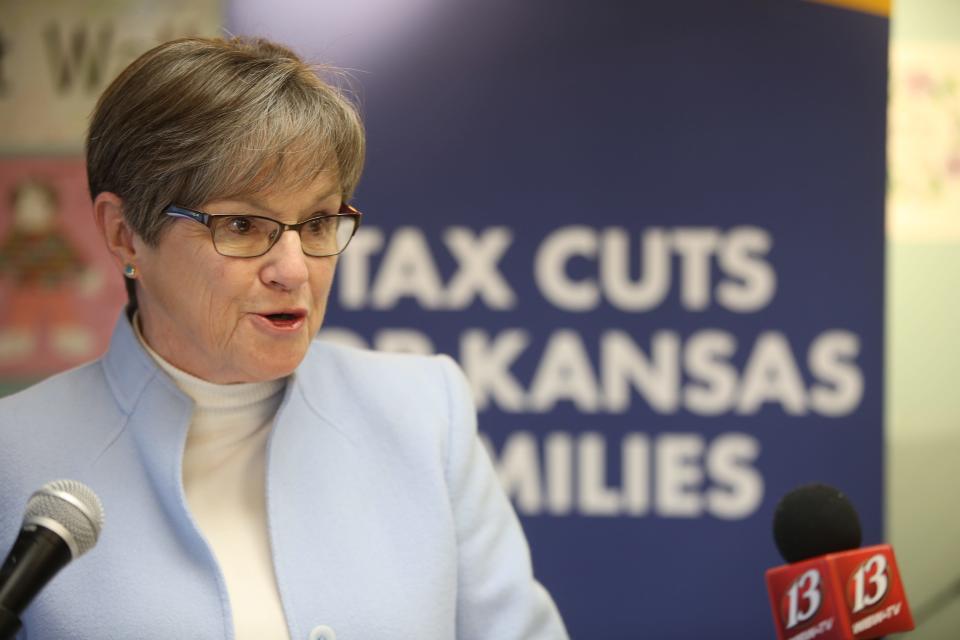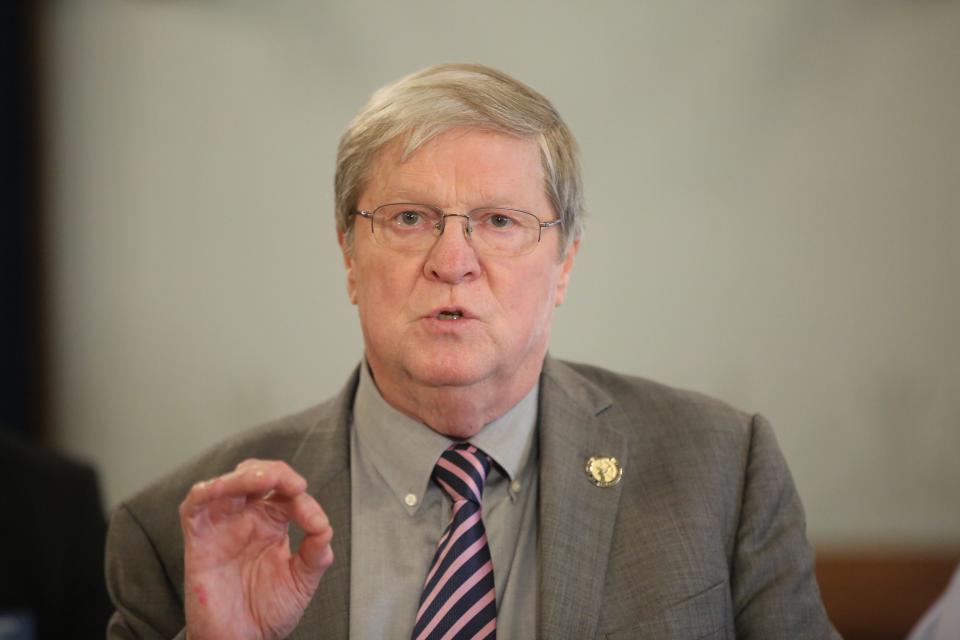Division over this tax cut idea could mean no relief for any Kansans in 2024
The Kansas Legislature reconvenes Monday, and tax cut plans already appear to be on a collision course with a gubernatorial veto, setting up the prospects of no tax cuts in an election year despite a healthy budget surplus.
As legislators return to Topeka, there appears to be unanimous agreement that Kansans should get tax cuts and the budget can afford it. But there is little agreement on how to accomplish tax relief.
Political divisions could leave Kansans without tax relief for a second year in a row, which would leave politicians pointing the finger at each other as legislators ask their constituents to reelect them this fall.
Republicans will be ready to blame Democratic Gov. Laura Kelly, while Democrats will blame GOP leadership, namely Senate President Ty Masterson, R-Andover, and House Speaker Dan Hawkins, R-Wichita.

Masterson and Hawkins spent the fall traveling the state to promote tax cuts. They said their package would be similar to last year's — when Republicans packaged a couple dozen separate tax policies into two main packages, both with controversial items opposed by Democrats.
The most controversial and substantial tax cut proposal is to move to a single rate income tax, also known as a flat tax. Republicans contend it is simpler and fairer, while Democrats say it disproportionately helps richer Kansans.
Masterson said tax cuts are his No. 1 priority, and he is confident the Legislature will get a tax cut bill to the governor.
"Oh I think we can pass a bill," Masterson said. "I think she (Kelly) may veto it again, you know, against the will of the people. I mean, we were one short of a supermajority last year. So we'll see what happens."
If that does happen, Masterson thinks Kansans should blame the governor.
"I would," he said.
The governor doesn't appear as confident in the Legislature's ability to enact tax cuts.
"I've been concerned about tax cuts for several years now," Kelly said. "We should have done tax cuts last year."

While there are some tax cuts the governor would approve of, such as bipartisan calls to address state income taxes on Social Security benefits, as well as property tax relief, she won't sign a bill with those if it includes a flat tax.
"We've done a number of things that they have rejected, all in the interest of getting that flat tax across the finish line," Kelly said. "That's not going to happen. I will never sign a bill for a flat tax in the state of Kansas. I lived through the Brownback tax experiment. I saw what it did to our state, and the flat tax, while it wouldn't be as abrupt and as severe initially, over time we'd land in the same ditch."
Hawkins acknowledged the chance of no tax relief this year.
"There's always that concern simply because we've got to come up with a supermajority," said Hawkins, who added that he was "astonished" by the governor's veto "because it had so many good things in it."
But Democrats blame the lack of tax relief last year — and the prospect of a repeat this year — on Republicans bundling the flat tax with other tax cuts that have greater bipartisan support.
"I'm very fearful that the Republican leadership will play the same stupid games that they always play that result in no benefit to anyone," said House Minority Leader Vic Miller, D-Topeka.
Miller contended the GOP practice of bundling tax bills is tantamount to extortion.
"It's a take it or leave it," he said. "They know that there's things in there that are poison pills that we can't accept."
Miller said Republican leadership only wants to send Kelly a "gotcha bill that the governor has to veto" and doesn't want a "good" tax bill because "they're afraid Democrats will get some credit for doing something the right way."

It's not just Democrats who have taken issue with the practice.
"If it has other things in there ... that changes everything," said Sen. Carolyn McGinn, R-Sedgwick, who was one of the key senators in the middle of last year's failed veto override. "So I don't ever say I'm voting for something until I see it."
Last year, because the main tax cut plan failed its veto override vote in the Senate, the House never voted on an override.
The Senate vote was dramatic, first with McGinn casting the deciding vote to kill the bill.
Then a procedural move was used to try again. McGinn flipped to supporting it, while Sen. Rob Olson, R-Olathe, flipped to opposing it and Sen. Alicia Straub, R-Ellinwood, declined to support it. Olson has continued to defend his vote, which resulted in Masterson stripping him of a committee leadership position, while Straub has engaged in a public spat with Americans for Prosperity, which has been a top promoter of a flat tax.
McGinn said this fall that leadership had not talked to her about securing her support for a tax cut plan. She also expressed skepticism that Straub and Olson are now on board.
"You know how that went down," she said, with a laugh, of last year's vote. "I can't predict what those guys are ever going to do."
Jason Alatidd is a Statehouse reporter for The Topeka Capital-Journal. He can be reached by email at jalatidd@gannett.com. Follow him on X @Jason_Alatidd.
This article originally appeared on Topeka Capital-Journal: Division over Kansas GOP flat tax plan could mean no tax cuts in 2024

